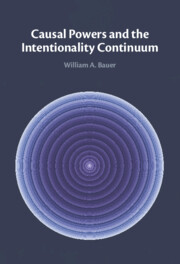Book contents
- Causal Powers and the Intentionality Continuum
- Causal Powers and the Intentionality Continuum
- Copyright page
- Dedication
- Contents
- Figures
- Preface
- Acknowledgments
- Abbreviations
- Introduction
- Part I Why Powers?
- Part II What Are Powers Like?
- Chapter 3 Powers from the Inside
- Chapter 4 A Defense of Physical Intentionality
- Chapter 5 A Defense of Physical Intentionality
- Chapter 6 Powers from the Inside
- Chapter 7 Powers from the Outside
- Chapter 8 Nature’s Intentionality Continuum
- Works Cited
- Index
Chapter 5 - A Defense of Physical Intentionality
Additional Marks and Objections
from Part II - What Are Powers Like?
Published online by Cambridge University Press: 13 October 2022
- Causal Powers and the Intentionality Continuum
- Causal Powers and the Intentionality Continuum
- Copyright page
- Dedication
- Contents
- Figures
- Preface
- Acknowledgments
- Abbreviations
- Introduction
- Part I Why Powers?
- Part II What Are Powers Like?
- Chapter 3 Powers from the Inside
- Chapter 4 A Defense of Physical Intentionality
- Chapter 5 A Defense of Physical Intentionality
- Chapter 6 Powers from the Inside
- Chapter 7 Powers from the Outside
- Chapter 8 Nature’s Intentionality Continuum
- Works Cited
- Index
Summary
Although the additional marks of intentionality discussed in this chapter are not essential for intentionality, when applied to powers they illuminate various aspects of the nature of powers and help justify the Physical Intentionality Thesis. The additional marks of intentionality include two linguistic marks (referential opacity, lack of truth import), unique intentional objects (the object of directedness could be one of a kind), impossible intentional objects (directedness toward an impossible object), extrinsicness (the object of directedness is extrinsic to the directed state), direction of causation (the object causes the directed state), and direction of fit (directed states have a particular fit in relation to their objects). The chapter’s penultimate section discusses three objections: that physical intentionality is mysterious, that physical intentionality is not sufficiently like mental intentionality, and that powers are directed toward nonexistent manifestations. Lastly, the chapter presents reasons why advocates of both the Universals Model and the Neo-Humean Model of modality should be open to assigning directedness and physical intentionality to properties.
Keywords
- Type
- Chapter
- Information
- Causal Powers and the Intentionality Continuum , pp. 113 - 140Publisher: Cambridge University PressPrint publication year: 2022



